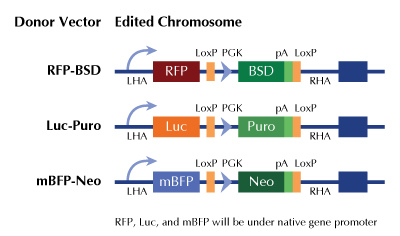KAT3A / CBP (CREBBP) Human Gene Knockout Kit (CRISPR)
CAT#: KN216439LP
CREBBP - human gene knockout kit via CRISPR, HDR mediated
Functional Cassette: GFP-puro RFP-BSD mBFP-Neo
HDR-mediated knockout kit validation
USD 1,657.00
4 Weeks*
Specifications
| Product Data | |
| Format | 2 gRNA vectors, 1 Luciferase-Puro donor, 1 scramble control |
| Donor DNA | Luciferase-Puro |
| Symbol | KAT3A / CBP |
| Locus ID | 1387 |
| Components |
KN216439G1, KAT3A / CBP gRNA vector 1 in pCas-Guide CRISPR vector KN216439G2, KAT3A / CBP gRNA vector 2 in pCas-Guide CRISPR vector KN216439LPD, donor DNA containing left and right homologous arms and Luciferase-Puro functional cassette. GE100003, scramble sequence in pCas-Guide vector |
| Disclaimer | These products are manufactured and supplied by OriGene under license from ERS. The kit is designed based on the best knowledge of CRISPR technology. The system has been functionally validated for knocking-in the cassette downstream the native promoter. The efficiency of the knock-out varies due to the nature of the biology and the complexity of the experimental process. |
| Reference Data | |
| RefSeq | NM_001079846, NM_004380 |
| UniProt ID | Q92793 |
| Synonyms | CBP; KAT3A; RSTS |
| Summary | This gene is ubiquitously expressed and is involved in the transcriptional coactivation of many different transcription factors. First isolated as a nuclear protein that binds to cAMP-response element binding protein (CREB), this gene is now known to play critical roles in embryonic development, growth control, and homeostasis by coupling chromatin remodeling to transcription factor recognition. The protein encoded by this gene has intrinsic histone acetyltransferase activity and also acts as a scaffold to stabilize additional protein interactions with the transcription complex. This protein acetylates both histone and non-histone proteins. This protein shares regions of very high sequence similarity with protein p300 in its bromodomain, cysteine-histidine-rich regions, and histone acetyltransferase domain. Mutations in this gene cause Rubinstein-Taybi syndrome (RTS). Chromosomal translocations involving this gene have been associated with acute myeloid leukemia. Alternative splicing results in multiple transcript variants encoding different isoforms. [provided by RefSeq, Feb 2009] |
Documents
| Product Manuals |
| FAQs |
| SDS |
Resources
Other Versions
| SKU | Description | Size | Price |
|---|---|---|---|
| KN216439 | CREBBP - human gene knockout kit via CRISPR, HDR mediated |
USD 1,657.00 |
|
| KN216439BN | CREBBP - human gene knockout kit via CRISPR, HDR mediated |
USD 1,657.00 |
|
| KN216439RB | CREBBP - human gene knockout kit via CRISPR, HDR mediated |
USD 1,657.00 |
|
| KN416439 | CREBBP - KN2.0, Human gene knockout kit via CRISPR, non-homology mediated. |
USD 1,657.00 |
|
| GA100973 | CREBBP CRISPRa kit - CRISPR gene activation of human CREB binding protein |
USD 1,657.00 |
{0} Product Review(s)
Be the first one to submit a review






























































































































































































































































 Germany
Germany
 Japan
Japan
 United Kingdom
United Kingdom
 China
China
